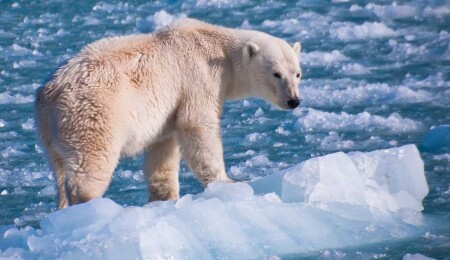Polar Bears Facing Endangered Status

The number of polar bears is declining every day due to the shrinking sea ice in the Arctic Ocean and the rapidly warming conditions in the region, which they struggle to adapt to.

According to data from the International Union for Conservation of Nature (IUCN), there are approximately 26,000 polar bears worldwide. However, climate change and global warming are threatening the lives of polar bears.
Polar bears are facing hunger as they have difficulty adapting their hunting methods to the melting sea ice due to climate change and the rapidly warming climate in the Arctic regions. Polar Bears International (PBI) designated February 27 as "International Polar Bear Day" in 2011 to raise awareness about the impact of global warming and climate change on polar bears.
PBI compiled information about the endangered polar bears and the challenges the species faces. According to data shared on PBI's website, the sea ice essential for polar bears, especially for hunting and breeding, is rapidly melting due to climate change, global warming, and high carbon emissions creating the greenhouse effect.
The shrinking of glaciers in the Arctic Circle is causing a decline in the polar bear population. Sharing a study published in the journal "Nature Climate Change," PBI stated that without reducing carbon emissions and taking further steps to combat climate change, all polar bears except a few populations could become extinct by 2100.
Steven Amstrup, a scientist at PBI, commented to the BBC, "For the first time, we're seeing that cubs can't survive. Cubs will be born, but females won't have enough body fat to produce milk during ice-free seasons."
"Adapting Hunting Habits to Climate Change"
According to a study published in the journal "Nature Communications," Canadian and American scientists observed that polar bears have difficulty adapting their hunting methods to glacier melt due to climate change. Researchers emphasized that during the hunting season for polar bears, which is late spring to early summer, glaciers mostly melt due to climate change, and the species becomes too exhausted to eat the prey they find after swimming for long hours.
Anthony Pagano, one of the researchers, pointed out that polar bears are exerting more effort while hunting, indicating that they are not benefiting from the different hunting strategies they have adopted due to melting glaciers. He also noted that their chances of survival decrease in the face of hunger.
"Climate Change is Not the Only Threat"
While climate change remains the biggest threat to polar bears, according to the World Wildlife Fund (WWF), it is not the only threat the species faces. WWF states that commercial activities such as oil and natural gas exploration and development, shipping, mining, and tourism, which are becoming more widespread due to increased accessibility in the Arctic Circle, are damaging the region's ecological balance and natural resources.
Contact with leaks from oil and gas exploration can reduce the insulation effect of a polar bear's fur, requiring more energy to keep warm, and ingesting leaked chemicals can poison the bear. Polar bears can also be exposed to toxic chemicals that affect the species' biological processes and reproductive ability through their prey.
"Solving the Issue by Moving Away from Fossil Fuels"
According to PBI, the widespread commercial activities in the Arctic Circle are causing environmental damage. While oil and gas exploration activities bring the risk of leaks, the consumption of fossil fuels and the emission of carbon into the environment during these activities pollute natural resources.
PBI emphasizes the need to move away from fossil fuels entirely to combat environmental pollution and climate change caused by fossil fuel consumption.


Comments
Attention!
Sending all kinds of financial, legal, criminal, administrative responsibility content arising from illegal, threatening, disturbing, insulting and abusive, humiliating, humiliating, vulgar, obscene, immoral, damaging personal rights or similar content. It belongs to the Member / Members.